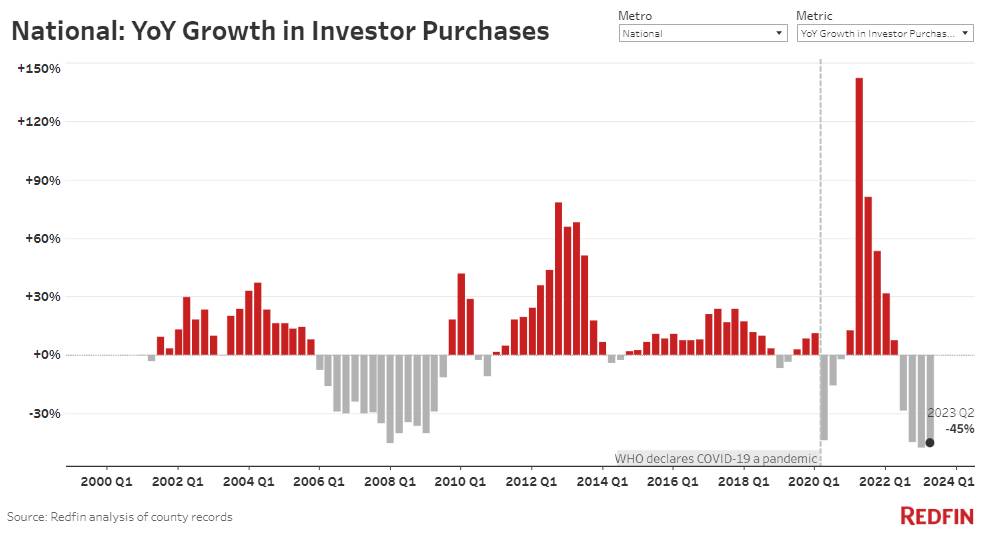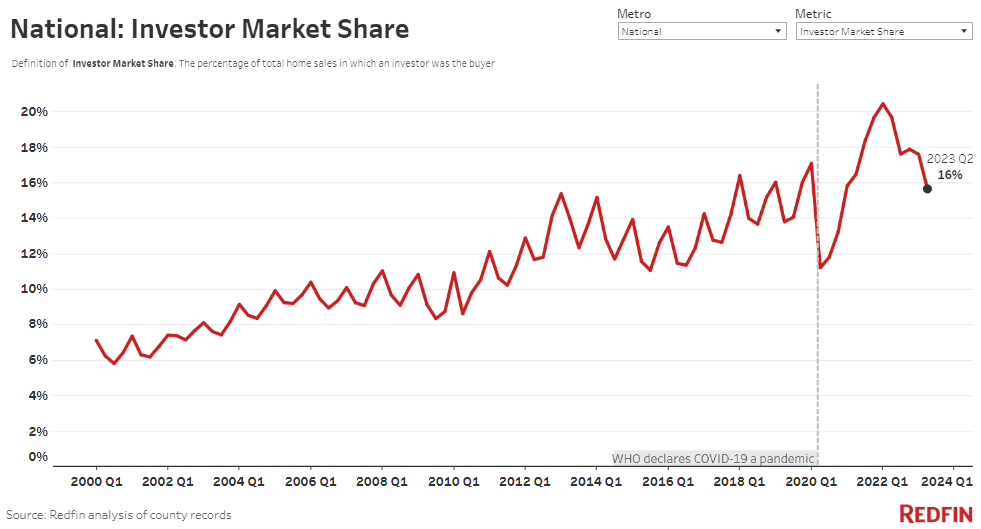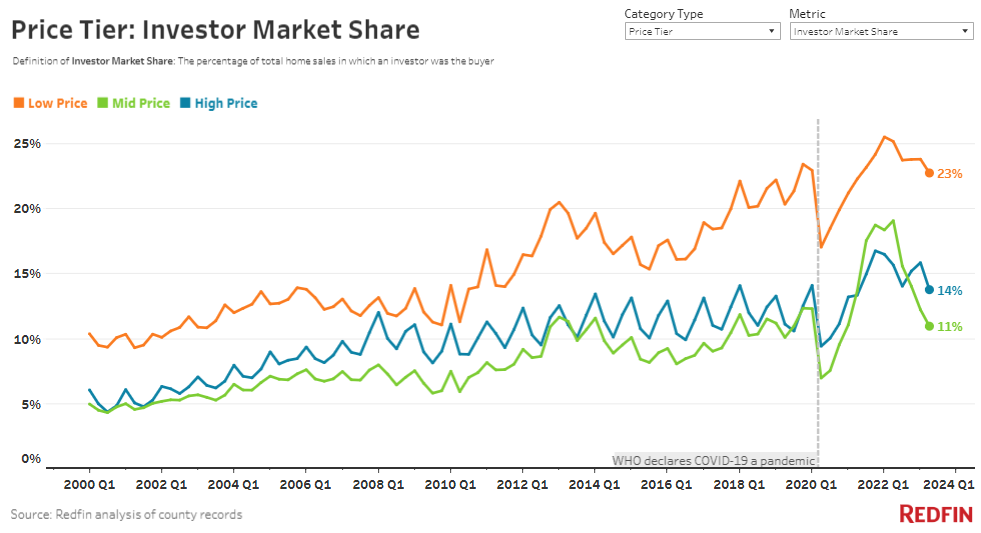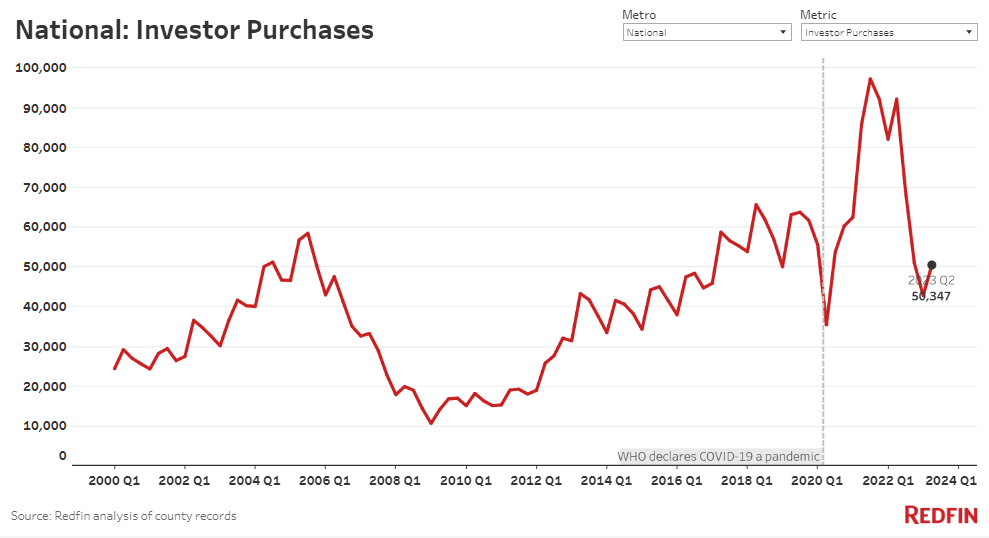Investor activity in the residential housing market is down sharply. Recent data from Redfin shows the number of homes purchased by investors down 45% from the second quarter of 2022 to the second quarter of this year.
A drop of 45% is massive and notable, especially when compared to the rest of the market. Home sales have dropped across the board, but only about 31%. This means that investor demand is falling considerably faster than that of homebuyers.

You can see this trend reflected in the graph, which shows, on a national level, the total share of residential properties purchased by investors. During the pandemic, strong investor demand saw investors scoop up the largest share of properties on record—peaking at around 20%. Now, as investor demand falls faster than homebuyer demand, this share has dropped to 16%.

Having 16% of properties bought by investors is still a higher number historically, but it’s equal to where things stood before the pandemic. This is a broad trend, but of course, there is variation.
The most notable way to slice the data (other than by location, which we’ll get to in a minute) is by price tier:

It seems that much of the run of investor activity during the pandemic was from mid-priced homes—but in recent months, it has come all the way back down to about pre-pandemic levels. Meanwhile, although they’ve come down a bit, low- and high-priced homes remain well above pre-pandemic levels.
So investors’ activity, in terms of market share, is back to roughly pre-pandemic levels. However, if you look at just the gross volume of properties purchased, it’s at the lowest level seen since 2016.

Of course, this data is on a national level, and there is large regional variation. Unsurprisingly, markets that saw the biggest spikes during the pandemic have reverted the fastest. Phoenix, a pandemic darling, has seen the share of investor purchases drop from 32% down to 17% in just the last year. Other major markets like Las Vegas and Atlanta have fallen fast too.
On the other hand, a few markets are actually seeing modest upticks in investor market share. New York City leads the way, going from 16% to 18%, with Cleveland, Chicago, and a few markets in California also up.
The Redfin report has a lot of regional data if you want to dig in and find your area.
Why Are Investors Leaving the Market Now?
Investors are buying less on a national level, but why? Why are investors fleeing the market right now? And perhaps more importantly: Why are they leaving the market at a faster rate than homebuyers?
First, we’ll start with the obvious. The cost of capital has increased dramatically, which squeezes cash flow and profitability. Combined with increased economic and market risk, the potential for profits in real estate has contracted.
Secondly, after the rapid appreciation of the pandemic years, the risk of a market correction is higher than it’s been in years. In addition, even if prices stay elevated, appreciation is likely to slow.
This is happening at a time when other asset classes are offering decent alternatives. The direction of the stock market is anyone’s guess, but what’s certain is that the yield on risk-free assets is improving. I know everyone hates when I talk about this stuff, but it matters.
The return on U.S. Treasuries and even high-yield savings accounts is much higher than it’s been in decades. If you can get a 5% cash-on-cash return on an almost-no-risk bond, is it worth the additional risk and operational burden of a rental property for a 7% cash-on-cash return? Is the risk-adjusted return for real estate still compelling?
Of course, cash flow is not the only way you make money in real estate, but hopefully, you see my point. There are real ways to earn cash flow other than real estate for the first time in a long time. This is enough to get some investors (probably those less dedicated to real estate than those reading this) to look elsewhere. To me, this is a key reason why investors are leaving the residential market faster than homebuyers.
For homebuyers, there are circumstances beyond finances that drive behavior. People buy and sell their primary residences for a host of reasons that include, but are not limited to, financial performance.
Investors are different. They are looking for the best place to earn risk-adjusted returns. And in my opinion, real estate is not as obvious of a choice for this as it was during the pandemic.
This isn’t to say that real estate is a bad place to put your money. I have been investing actively in 2023, and I am continuing to look for more deals. But, the pandemic presented a unique opportunity to profit from real estate, and that has faded. Real estate is reverting to where it was pre-pandemic, likely with more risk. To me, it’s natural to see investor activity decline as affordability remains low and the economic picture remains cloudy.
There Is Still Value in Real Estate Investing
The same Redfin study shows that investors who are active are doing well. For flippers, the average increase in property value is 61%. This is down from pandemic highs of 69%, but is still very large. Also, only 3% of flips were sold at a loss in June—down from 29% last fall.
So yes, some investors are leaving the market due to fear or to pursue alternative asset classes, but for those who stay, things are going well (at least for flippers).
For rental property investors, it’s harder to measure success on a large, macro scale. But from my experience and speaking with friends, it’s the same as it’s been for years. Deals are somewhat scarce, but there are still good ones to be found. There is less competition, with more motivated sellers, and value-add business plans are particularly effective.
The bottom line: You can absolutely still make money in real estate, especially over the long term.
Join the community
Ready to succeed in real estate investing? Create a free BiggerPockets account to learn about investment strategies; ask questions and get answers from our community of +2 million members; connect with investor-friendly agents; and so much more.
Note By BiggerPockets: These are opinions written by the author and do not necessarily represent the opinions of BiggerPockets.

